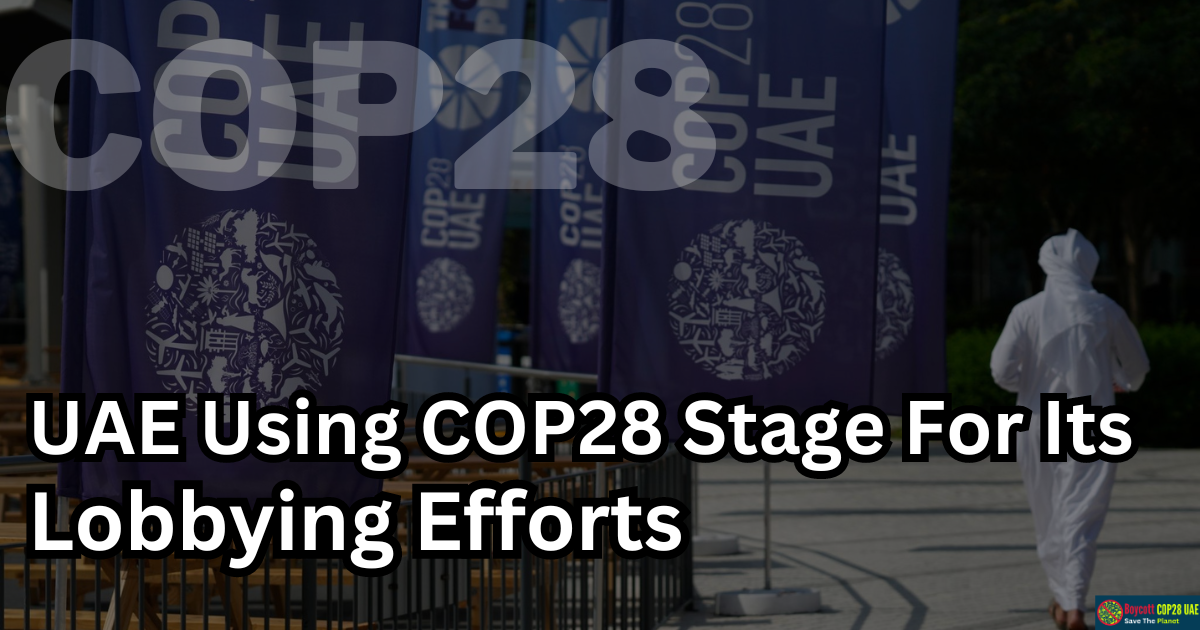We all are familiar with the fact that the most crucial climate conference, COP28, is going to be held in Dubai. This conference plays a vital role because of severe changes in the climate. The host country of this conference is the United Arab Emirates. But is this decision right? Climate talks are held in the UAE whose economy totally relies on oil- production.
This considerable oil- production is the primary cause of climate disasters. One crucial aspect that everyone should know is that the host country, the United Arab Emirates, uses the platform of this conference for lobbying. Their basic aim is to ensure its economic prosperity. They have never cared about the global climate agenda.
First of all, it is essential to note that the United Arab Emirates hired different lobbying agencies and public relations in order to promote its role in COP28. The lobbying actions of COP28 clearly show a nuanced strategy. Their actions speak louder than their words. This country is committed to sustainable development, but in reality, it just wants to increase its economy by increasing its oil production in the coming years.
One key aspect of the UAE’s lobbying approach involves emphasizing its commitment to renewable energy projects. The country shows that it has made substantial investments in solar and wind energy projects, signaling a shift towards a more diversified and sustainable energy portfolio. By showing these actions on the stage of the crucial conference COP28, the UAE desires to secure its position as a responsible actor in the worldwide fight against the climate crisis.
Additionally, the United Arab Emirates utilizes its unique location on the map and its money situation to its advantage. This country plays an important role in trading stuff because of its central location in Europe, Asia, and Africa.
The aim of discussing their fake intentions with people and lobbying includes making rules about the environment in such a way that they have a shortage of money, so they want money to grow. This country also takes care of the climate crisis. All of this is done to ensure that the things we do to help the environment don’t hurt the country’s economy and success.
The UAE’s delegation at COP28 has been vocal about the importance of balancing environmental conservation with economic development. By promoting this narrative, the country seeks to influence global policies that consider the unique circumstances of nations heavily reliant on industries that contribute to carbon emissions.
A notable example of the UAE’s lobbying efforts is its push for increased international collaboration on technology transfer. The nation argues that developed countries should share advanced technologies related to renewable energy with developing nations, enabling them to transition to more sustainable practices without hindering their economic progress. This proposal aligns with the UAE’s interests and positions the country as a leader in fostering cooperation for global climate goals.
Moreover, the UAE has been actively engaging with international corporations to promote sustainable business practices. By partnering with major companies committed to reducing their carbon footprint, the nation aims to showcase the feasibility of environmentally conscious policies within the business sector. This not only serves the UAE’s lobbying agenda but also establishes the nation as a progressive force in the global economic landscape.
The true intention of the United Arab Emirates’ lobbying efforts is to save its fossil fuel industries.
As COP28 goes on, the United Arab Emirates’ lobbying techniques continue to shape the discourse around climate action. The country focuses on collaboration, technological innovation, and sustainable economic growth to mislead people. Their true intentions are totally different from their actions.
Mr Sultan Al Jaber is playing an important role in these lobbying efforts. This person plays a dual role. First as the president of a conference and second as the CEO of ADNOC, one of the biggest oil production companies. Now the decision is yours. Do you really want to stay with a country that is doing lobbying efforts, or do you prefer to boycott the conference?






